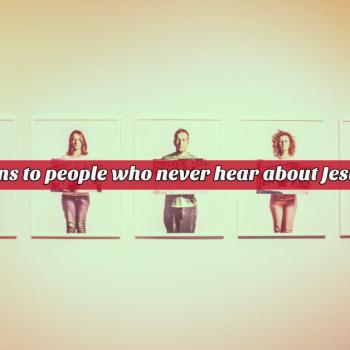I am excited to have a post here by David Ozab. He is a writer and recently converted to Roman Catholicism. While I do not share his convictions, certainly it is beneficial to hear from others outside of our own sphere of experience. I am pleased to have his guest contribution on the blog…
—————————————

There was once a guy who was stranded on a deserted island. After many years, a passing ship found him. As he showed the crew around the island, they were amazed at the many structures he had built for himself:
“So what is that building?”
“That’s my house.”
“And that one over there?”
“My shower and my outhouse.”
“And the oval area over there?”
“A track that I run around daily.”
“And the big building with the steeple?”
“That’s my church.”
The crew looked puzzled. “If that’s your church, then what’s the bigger building with the even taller steeple?”
“That’s the church I used to belong to.”
An old joke that illustrates an ever older problem: schism.
As a former Protestant I can tell you that the witness of Protestantism has always been, (with apologies to Martin Luther, as this wasn’t his intent): “Here I stand . . . and there I go, right out the door to start my own church.” First there was a single Protestant movement, then Luther and Zwingli disagreed over the Eucharist and we got the Lutheran and the Reformed traditions, then some folks thought only adults should be baptized and thus came the Anabaptists. Each disagreement brought a new split and each split created a new denomination. Today there are over a thousand and they just keep splitting. The inevitable result: one billion churches with one member each.
If I wasn’t such a “catholic” at heart, I’d be happy with the First (and Only) Church of David Ozab. No messy disagreements, no cheesy music, and no getting up early for church. I’d attend “St. Mattress by the Bedsprings” each Sunday morning, and if I happened to fall asleep no one would poke me in the ribs. But I know I am called to something else: communion.
When I first felt that call ten years ago, I returned to the church of my baptism: the Episcopal Church. At first it seemed like the perfect place for me. It allowed me to grow in my “lower-case” catholic faith within a context that helped me avoid harder questions. I could put aside differences with the Vatican over clerical celibacy, women’s ordination, contraception, and marriage equality, and keep the aspects of the Catholic faith I liked—the Blessed Virgin, the saints, the Eucharist, the rosary, incense, holy water, etc. “All of pageantry; none of the guilt” is a running joke among liberal Episcopalians.
But was it enough? I kept coming back to the Creed, and specifically to the Four Marks of the Church: “One, Holy, Catholic, and Apostolic.” I said those words every Sunday, but did they apply to my own church?
Holy? Yes. I’ve met many holy men and women through my church—as I have through every Christian denomination. They are as flawed and sinful as I am, yet I could see the Holy Spirit working through them, bringing them and the people around them closer to God.
Catholic? Yes. Not only is Anglicanism spread across the world, it is spread across time through the liturgy. Every day, when I said the offices of Morning and Evening Prayer, and every week, when I attended the celebration of the Eucharist, I prayed together with Christians around the world and throughout time—using the same words that have been said (in English, Latin, or Greek) for almost two thousand years.
Apostolic? Maybe. I knew the validity of Anglican orders had been denied by Rome, but as an Anglican I was used to ignoring the Pope. I also knew that we alone among Protestants had preserved the ordained ministries of Bishops, Priests, and Deacons as an essential part of our tradition.
One? No. Like all the churches born of the Reformation, Anglicanism began in schism and multiplies through schism. REC, ACC, APK, ACNA, etc— an alphabet soup of continuing churches.
“Here I stand . . . and out I go.” Over and over again.
And where was the one place that I found the Four Marks of the Church? In the only communion in Western Christianity that for all its faults takes Christ’s command to “love one another as I have loved you”* seriously: the Catholic Church.
So, after much prayer and discernment, I decided to become Catholic, and at Easter I was received into full communion.
At the height of the Reformation, the Church had few critics more severe than Desiderius Erasmus. Yet to the disappointment of Luther, he refused to leave. His eloquent reason expresses the love all Catholics share for this most holy, yet most human of institutions:
“I will put up with this Church until I see a better one; and it will have to put up with me, until I become better.”**
Here we stand; we can do no other. God help us all.
Amen.
*John 15:12 ** Diarmaid MacCulloch, The Reformation, p. 152











